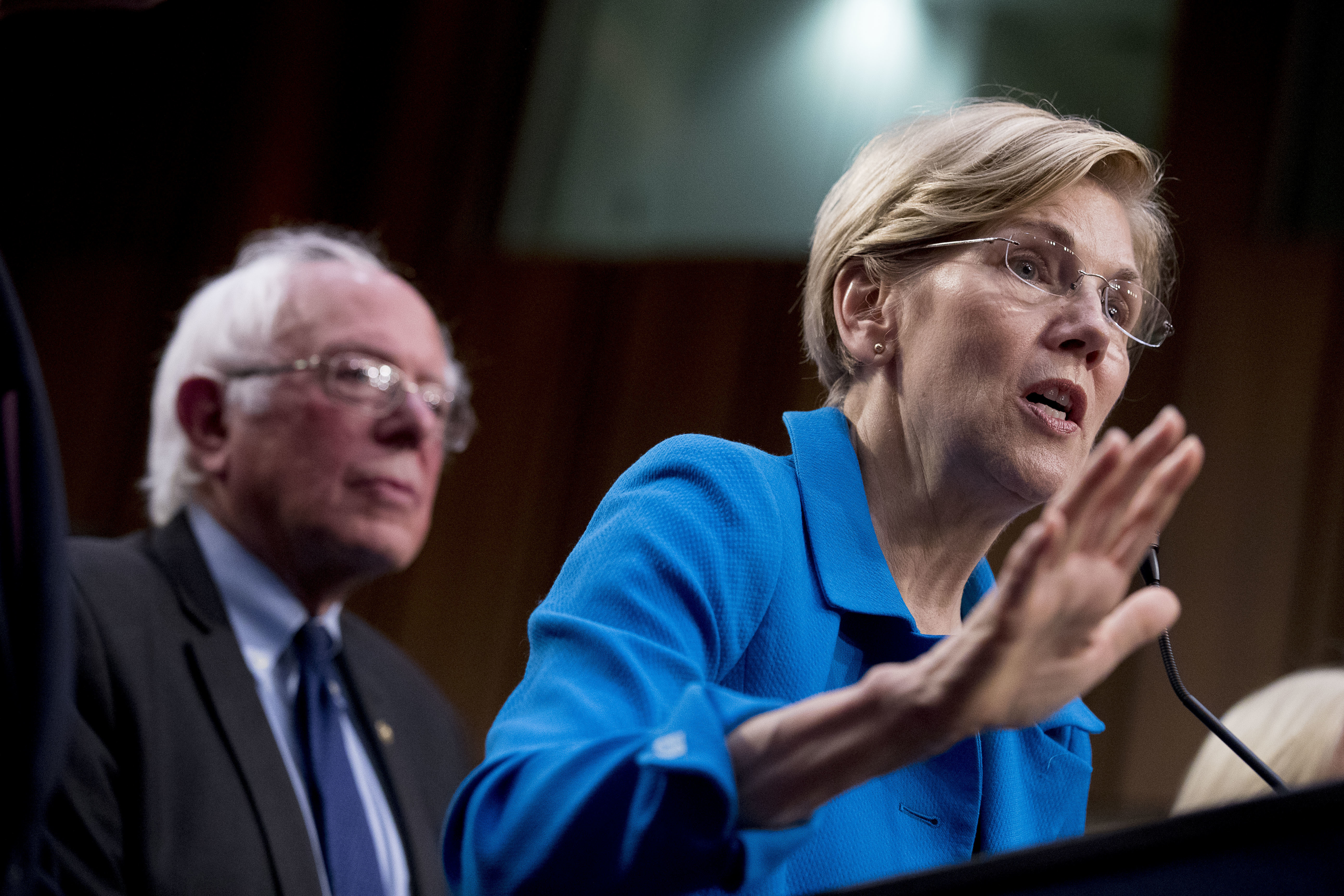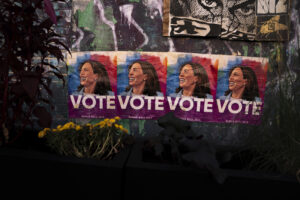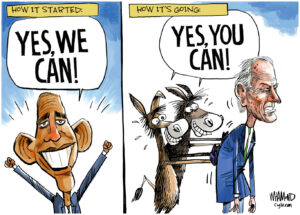Three Key Issues on Which Democrats Are Moving Left
On reparations, Medicare-for-all and climate change, candidates are proposing and supporting ideas considered “fringe” not so long ago. Presidential candidates Sens. Elizabeth Warren, D-Mass., and Bernie Sanders, I-Vt. (Andrew Harnik / AP)
Presidential candidates Sens. Elizabeth Warren, D-Mass., and Bernie Sanders, I-Vt. (Andrew Harnik / AP)
Early in the 2020 primary, many Democratic candidates are moving leftward, in speeches and in media interviews and, among current officeholders, sometimes in the bills they co-sponsor.
All the Democratic senators running for president in 2020 have supported at least one version of a Medicare-for-all bill. Former housing secretary Julián Castro has called for a federal study on reparations for black Americans. The House and Senate both have Green New Deal proposals involving wide-ranging environmental programs to slow climate change and create jobs. And, as The New York Times reports, during the Philadelphia stop of his book tour, candidate and South Bend, Ind., Mayor Pete Buttigieg indicated that he would consider court packing, a topic that was arguably last viable during the Franklin Roosevelt administration.
“This is not your father’s Democratic Party, and it’s not 2016 anymore,” James Hohman observes in The Washington Post. That Democratic candidates are leaning left reveals the “success” of a strategy used by activists: “pushing an issue that had mostly thrived on the fringe into the 2020 conversation,” Sydney Ember and Astead Herndon write in The New York Times
According to Ember and Herndon, “Activists are leveraging the early stages of the Democratic primary, creating pseudo-litmus tests for candidates eager to respond to the energy that is driving more extreme policy proposals.”
The strategy has influenced the questions candidates are getting at campaign events, both from the press and from the crowds in attendance. Ember and Herndon write:
Senator Bernie Sanders, for instance, has been asked repeatedly about reparations, including recently on ABC’s “The View.” Senator Elizabeth Warren answered a question about ending the filibuster at an event last week in New York. And on Sunday, Mr. Buttigieg was asked again about packing the courts — during a town hall-style forum on CNN
Some question whether procedural issues, such as adding justices to the Supreme Court or abolishing the filibuster, can gain traction with voters. “I would be knocked over with a feather if voters picked the Democratic nominee for president on the basis of getting rid of the filibuster,” Robert Shrum, a Democratic strategist who has worked for everyone from the late Sen. Ted Kennedy to former Secretary of State John Kerry, told the Times.
Just a few years ago, many of these issues seemed like what the Times article refers to as “fringe.”
When he ran for president in 2008, Barack Obama opposed directly paying reparations to descendants of slaves in America. In his answers to an NAACP candidate questionnaire, he called reparations “an excuse for some to say ‘we’ve paid our debt’ and to avoid the much harder work” of fighting structural racism in America. In 2016, Hillary Clinton deflected the question in multiple interviews, stressing instead, on the podcast Another Round, that America needs to make “many more investments in everything from preschool education to affordable housing; that’s my form of trying to give people the chance to be empowered.” Bernie Sanders called it “divisive” at the Iowa Brown & Black Presidential Forum, before echoing both Obama and Clinton’s emphasis on broad programs to boost economic equality across multiple groups.
While Sanders advocated for single-payer health insurance in 2016, Clinton stopped short, and in 2009, even a Democratic Congress resisted a Medicare opt-in, threatening the Affordable Care Act. Now, as CNBC points out, “The same public option looks like a small step for a Democratic Party that has embraced sweeping change on health care as it looks to recapture the White House.”
In the 2020 primary, activists say they’re committed to driving the conversation toward progressive issues. Proponents of the Green New Deal are just one example. “We’re going to ensure that no one gets out of these primary states like Iowa and New Hampshire without hearing about the Green New Deal over and over and over again,” Varshini Prakash, executive director of the Sunrise Movement, which was instrumental in developing the House bill, told the Times.
Jenifer Fernandez Ancona, a leader of the grassroots funding group Women Donors Network, concurred, telling the Times, “The path to electability is through boldness right now.”
Your support is crucial...As we navigate an uncertain 2025, with a new administration questioning press freedoms, the risks are clear: our ability to report freely is under threat.
Your tax-deductible donation enables us to dig deeper, delivering fearless investigative reporting and analysis that exposes the reality beneath the headlines — without compromise.
Now is the time to take action. Stand with our courageous journalists. Donate today to protect a free press, uphold democracy and uncover the stories that need to be told.






You need to be a supporter to comment.
There are currently no responses to this article.
Be the first to respond.